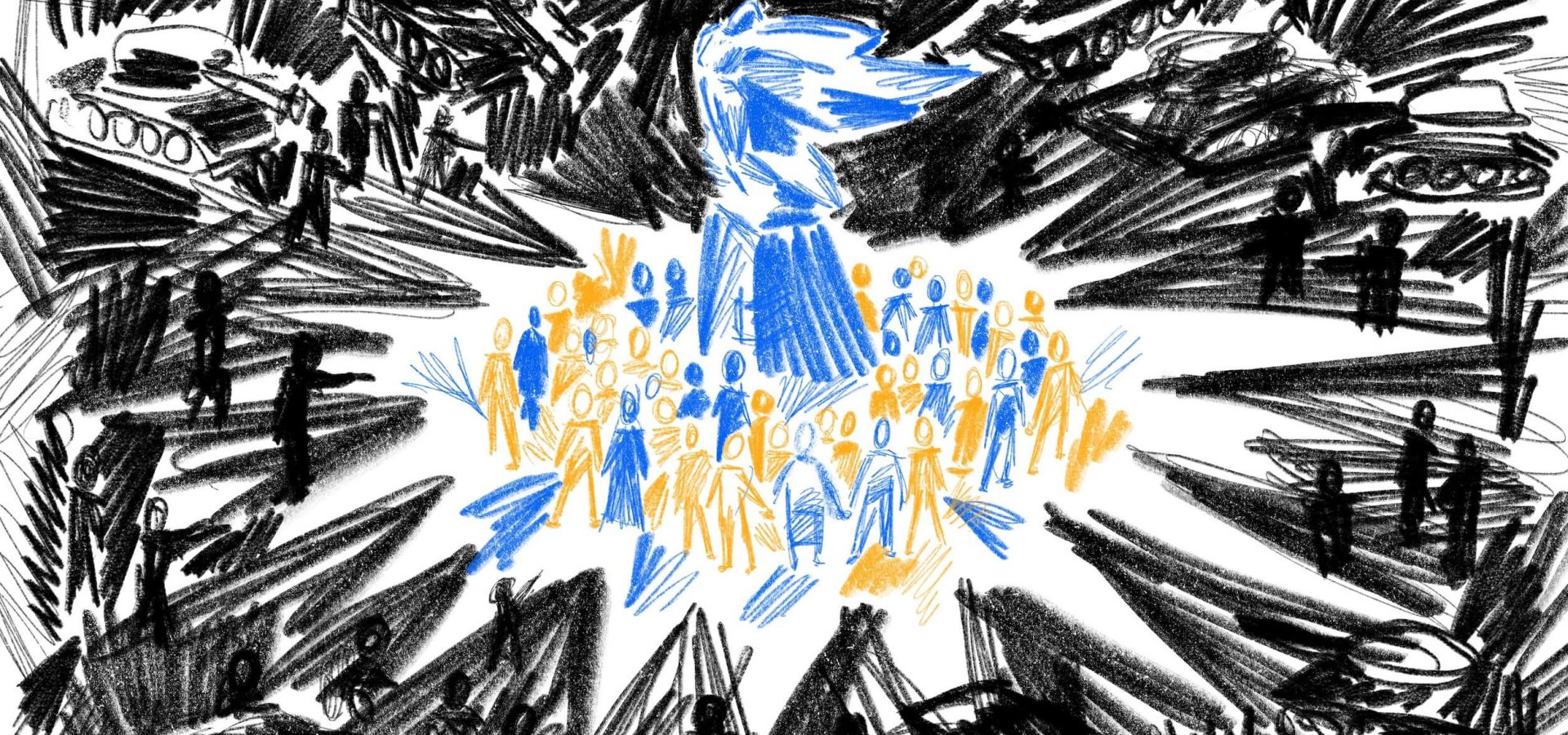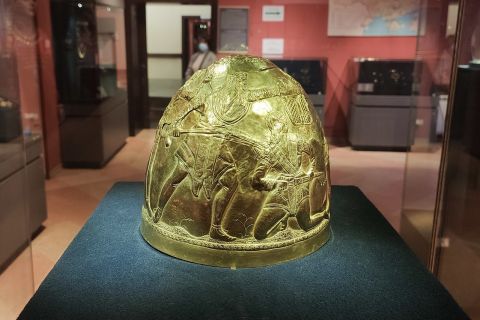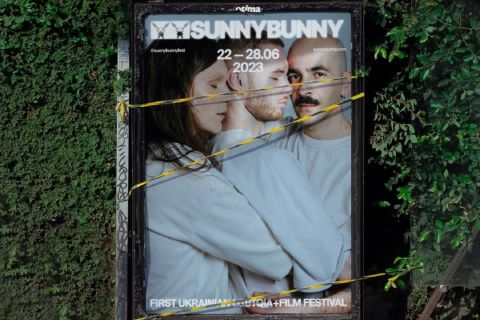
“When Russians Came, our City Became Desolate”: Ukrainians Tell about Their Life in Occupied Cities
Ukraine has been at war for three weeks already. In these weeks, Russians managed to occupy multiple Ukrainian cities in the southern part of the country. The invaders captured administrative buildings, set up checkpoints near the entrances to the cities, and started patrolling the areas. Some people were unable to leave, having no transport, being cut off at the exits, or picking the wrong timing. Bird in Flight learned from the residents of occupied cities how their lives changed when Russian soldiers came.
Personal names were changed at our sources’ request.

Stayed in Kherson with his girlfriend, mother, and brother
— Rumours that nobody was allowed to leave the city had been spreading since the very first day of the war. Even if it weren’t so, without a car of my own, I couldn’t leave. Later, I bought tickets to Lviv, and my employer was ready to cover my housing expenses there. However, the train was cancelled, and we had to stay.
Russians entered Kherson on the 1st of March. We learned about it from the Telegram channels and our friends from the suburbs. To my knowledge, there was no resistance. The Russians inched forward, chaotically shelling the houses. They hit the school where I used to study, a block of flats, and a power station. Then the Russians started shelling Fabryka (the city’s largest mall), which burned down to the ground afterwards.
I saw the Russians for the first time a few days ago. They ran at full speed on new off-roaders ([Toyota] Prado and [Mercedes-Benz] G-Wagons) with the letter Z painted on their doors. According to several Telegram channels, they took these from a car dealer shop in the Kherson outskirts.
Having entered the city limits, the Russian Federation’s troops looted the Europort mall. Locals started looting Fabryka after that, taking food, clothes and handbags. Our friends streamed the whole thing on the spot, so I could say that I saw it with my own eyes. Although it’s not nearly as frequent now, the traces of looting are still evident, like broken windows in jewellery shops and smashed doors in the ATB [a major supermarket chain in Ukraine] supermarkets and tobacco outlets.
In the city the Russian Federation’s troops looted the Europort mall. Locals started looting Fabryka after that, taking food, clothes and handbags.
Food is scarce in the city, especially in the central part, where we live. We couldn’t buy potatoes for three days. We spent an hour and a half in the queue and bought only a kilo and a half of them. The situation with meat is even more dire. The queues are enormous and hardly move at all. After an hour and a half, we decided to call it quits there.
There is more food in the suburbs if you know where to look. Still, meat, sausages, dairy, and eggs are scarce. I assume that volunteers are to blame for the scarcity of food. They are buying everything in huge quantities. I realize that their intentions are good though.
Generally speaking, people in the city have started sticking together even more since the Russians came, helping one another and holding rallies. I didn’t participate in any of them because I was busy looking for food, but those who were there said the protesters showed no fear of the invaders, and the Russians would be killed in a stampede if they opened fire.
Also, everyone has started paying more attention to the information they consume. It is a necessity under a barrage of fake news. For one, people said that eleven girls were raped in our city. Later, our mayor said that it was a hoax. Who and why would spread such rumours is beyond me. Probably, they did it to create panic.
What I don’t want to do anymore is to walk around the city. There is a constant fear for your life, and who knows what is going on in the Russian soldiers’ heads. Yesterday, a patrol stopped my friend. They checked his passport and were surprised that he was Ukrainian. “Who did you expect to see here?” he answered. They let him go, but he had to deal with another patrol a mere hundred metres away.
Yesterday, a patrol stopped my friend. They checked his passport and were surprised that he was Ukrainian. “Who did you expect to see here?” he answered.
I heard sirens for the last time when the Russians entered the city. Now everything is calm. The day before yesterday [on the 8th of March], our mayor asked locals to return to work and support Kherson’s economy. Small coffee shops, confectioneries, and Eva [a chain selling personal care and beauty products] reopened, booths with groceries appeared. Some of the public transport returned to the streets. However, the curfew is still in place from 8 PM to 6 AM, and we mind it.
While the Russians are here, any plans are out of the question. I sure would like to leave, but it’s dangerous now: the only way is through Mykolaiv, where the fighting continues. Besides, the Russians are all over the region now, and there is no telling where you might meet them.
Still, I am sure that the Armed Forces of Ukraine will take back the city. Today is not 2014, and Kherson is not Crimea. I know no local who would want our city to become a part of Russia. Nobody wants Russia here. Even if the city is not retaken, I won’t live under the Russian flag. Too many people I knew have died for Ukraine. Speaking of the flags, Ukrainian flags are still fluttering over the Regional Administration and Regional Council building. None was willing to hoist them down.

Stayed in Nova Kakhovka with her family
— I woke up at 5 AM on the 24th of February from the sound of an explosion. First, I thought it was just a drill. Then windows shook from the second one, and I pushed my kid from the bed on the floor. I saw the glow behind my window—it was a military post burning. We are living in a block of flats. Fearing for our lives, we packed our things and set off to Kozatske [an urban-type settlement near Kherson], where we have a house. We thought we would be safer there. We were wrong.
When we arrived in Kozatske, shelling began. Mortars were firing, and the Grad missiles were flying up above. There was no proper shelter. The village was cut off from the world. There was no water or electricity. In five days, we returned to Nova Kakhovka through a “green corridor”, with Russians accompanying our buses. I left my grandpa, grandma, and dad in that village. They have no food or means of communication. Only yesterday we managed to send them a parcel with food.
When Russians came to Nova Kakhovka, the city became desolate. They don’t talk to us, nor do we speak to them. Some show aggression, and some don’t. Waiting in the “green corridor”, we saw soldiers sitting on the vehicles that drove by. They looked in the windows of our bus. Some motioned at us, like, to encourage us to hold on, and others aimed their rifles at us.
Some motioned at us, like, to encourage us to hold on, and others aimed their rifles at us.
They inspect people at checkpoints. When it was our turn, the Russian took the phone from the girl who stood near us. She was devastated because it was expensive and she had bought it only recently.
Sometimes, the Russians stop cars in the city to inspect. Generally, though, they are calm toward locals. If you don’t mess up with them, they won’t mess up with you.
As a general rule, people in the city who have money are never hungry. For others, it’s more complicated. My grandma, for instance, can’t get her pension because our postal service is not working. She has no bank card, and even if she had, she wouldn’t be able to cash out—a postman usually brings the money in person. Getting food is problematic, so I begin every day by going to shops and pharmacies and looking for whatever we need. This is how I spend most of my day—standing in the queues in the cold. If you bring something home by evening, your family rejoices, and you feel like a breadwinner. At 6 PM, we draw the curtains and turn off the lights. There is no stable internet here, so we watch TV in the evening.
This is how I spend most of my day—standing in the queues in the cold. If you bring something home by evening, your family rejoices, and you feel like a breadwinner.
Ukrainian channels have been blocked, and the Russian ones were launched, but we don’t watch them. I can’t stand to listen to their lies. The TV is rather a way to entertain kids. They are happy to watch some cartoons. Before we go to bed, we pray that everything works out alright. Then the morning comes, and the day repeats itself.
Many people walk out on rallies, but I have no time for that because I need to occupy myself with my kid. She is seven and a half years old, and she sits around doing nothing. The school has been cancelled. They wanted to go remote, but it’s impossible with the internet quality we have here.
Having entered the city, the Russians raised their flag at the hydroelectric power station. They did the same in the city, but locals soon replaced Russian tricolours with Ukrainian flags.
I don’t want my city to be retaken by force because civilians will suffer from hostilities. I want the occupiers to leave on their own. I haven’t thought yet about what I will do if they don’t. But I hope for the better.

Lives in Melitopol with his wife and kids
— We heard the news about the war at night in bed, like many others. Our city was taken overnight, so I had no time to leave. Frankly, no one was ready to evacuate. Everyone was hoping for the better, that the frontline won’t move this far.
First, Russian equipment stayed in the outskirts, waiting for the infantry, and then set off for Melitopol. Having entered the city, they started pushing out leftover Ukrainian forces from the Ukrainian Security Service building. And then they captured the hospital.
The city didn’t calm down even after the occupation. The Russians are shelling Ukrainian positions every night, probably targeting defensive posts near Zaporizhzhia. Besides, lots of military hardware keeps coming through Melitopol because there is a junction here.
My daily routine is not that exciting. I help my family in the morning, feeding and taking care of whoever needs it. Then I go out to the city to look for food. I do hairdressing during the day, but the appointments are few and far between—many of my clients left, and others have no money for that already. In the evening, I occupy myself with kids, trying to teach them something.
Protests have become another staple of my day. I go to the rallies every day, and I’m not alone in that. I believe a few thousand Melitopol residents gather there. At first, it was scary. People were agitated. They drove away Russian patrols and stopped vehicles. On the third day, one of the Russians fired a shot in the crowd’s direction during the rally near the Ukrainian Security Service building, hitting a protester in the leg. After that, tensions eased a bit.
On the third day, one of the Russians fired a shot in the crowd’s direction during the rally near the SBU building, hitting a protester in the leg. After this incident, people started fearing them.
Seeing the crowd of locals, Russian soldiers froze. At least, initially. Five days into the occupation of Melitopol, they brought the Federal Russian Guard troops with dogs here. They can’t shoot civilians, so they will fight us in the ways they are used to—by cordoning and arresting.
My friends said that the occupiers asked people of Melitopol through the mayor not to call Putin names or flip the soldiers off. Some protesters—members of religious organisations—agree with this. Their religion prohibits them from swearing. Otherwise, there are no differences among the protesters. They demand only one thing—that the invaders leave the city.
To convey our demands, we hold actions. Yesterday, for instance, we launched paper planes made from leaflets about how occupiers need to surrender.
Soldiers react to passers-by on the streets in different ways. Conscripts stay silent and look shocked by what happens here. A friend of mine talked to a patrol in the street, and they told him they didn’t want to fight themselves. Once, I passed another squad and said “Glory to Ukraine!” to them. One of the soldiers echoed, “Glory”.
Before the Russians came, everything had been OK here. The city was improving, stadiums were built. Now it all stopped. Hopefully, Melitopol will soon return to Ukrainian rule. I will have to leave if it doesn’t. I don’t know how I will do it, though.
Cover illustration: Viktor Hrudakov






